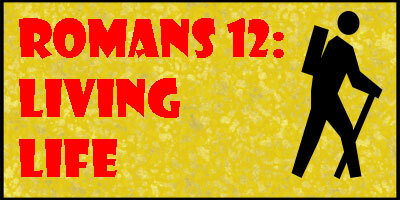
G’day and welcome to Partakers Christian Podcasts! Join us for uplifting Bible teaching, inspiring readings, heartfelt worship, powerful prayers, and fascinating church history. Whether you’re new to faith or growing deeper in your journey, we’re here to encourage and equip you. 🎧 Tune in, interact, and be inspired—wherever you are in the world.
Episodes

Thursday Sep 07, 2023
Romans 12 - Living Life - Part 07
Thursday Sep 07, 2023
Thursday Sep 07, 2023

Romans 12: Living Life
Study 07: Gift of Prophecy
Now Paul comes to the expression of the Roman Christians faith – their gifts! First of all we have prophecy! Much debate is made of what Paul means here by this word “prophecy!”
Calvin’s opinion is that Paul means any one skilfully and wisely performed the office of an interpreter in explaining the will & mind of God. For example, preaching. That is in his own words “hardly anything else than the right understanding of the Scripture, and the peculiar faculty of explaining it, inasmuch as all the ancient prophecies and all the oracles of God have been completed in Christ and in his gospel.”
Others insist that prophecy is the prediction of future events as pre-thought by the mind of God, such as occurred at the beginning of the church and recorded for us in the New Testament. Yet others, would insist that prophecy was only those writing what we have as the New Testament today, and that this gift of prophecy has expired and is no longer in use for today.
I am of the mind that it is both the correct explanation of God’s mind in preaching and the speaking of future events… Whether we preach or predict, we prophecy and Paul exhorts his readers, the original and also us today, to use our faith to speak God’s mind and will. That is what the prophets of the Old Testament did – revealed God’s mind and will to the people.
That is our job today too – revealing God’s mind and will to people – not just in preaching and in prophecy, but also in evangelism – telling others what Jesus, the Son of God, did in his birth, life, death, resurrection and ascension. Preaching and prophecy are gifts from God and are the outworks of faith of the believers who have those gifts.
Tomorrow – another gift - serving!!
Right Mouse click or Tap here to save this Episode as an audio mp3 file

Wednesday Sep 06, 2023
Psalm On Demand - Psalm 6
Wednesday Sep 06, 2023
Wednesday Sep 06, 2023
Psalm 6
neither discipline me in your wrath.
6:2 Have mercy on me, Yahweh, for I am faint.
Yahweh, heal me, for my bones are troubled.
6:3 My soul is also in great anguish.
But you, Yahweh-how long?
6:4 Return, Yahweh.
Deliver my soul, and save me for your loving kindness' sake.
6:5 For in death there is no memory of you.
In Sheol, who shall give you thanks?
6:6 I am weary with my groaning.
Every night I flood my bed. I drench my couch with my tears.
6:7 My eye wastes away because of grief.
It grows old because of all my adversaries.
6:8 Depart from me, all you workers of iniquity,
for Yahweh has heard the voice of my weeping.
6:9 Yahweh has heard my supplication.
Yahweh accepts my prayer.
6:10 May all my enemies be ashamed and dismayed.
They shall turn back, they shall be disgraced suddenly.
Right mouse click or tap here to save/download this Psalm as a MP3 file
Click or Tap here to visit our page to download all 150 Psalms as mp3 files

Wednesday Sep 06, 2023
Romans 12 - Living Life - Part 06
Wednesday Sep 06, 2023
Wednesday Sep 06, 2023

Romans 12: Living Life
Study 06: Gifted Graciously!
As we saw in our previous study, part of the Christian life is that each of us has special abilities and gifts! Paul uses the illustration of the human body! Your body is made up of many parts, each with a distinct purpose and function! So it is with the Church – Christ’s body! We have these gifts, each of us, because of God’s amazing grace toward us!
All Christian Disciples have Spiritual Gifts, for “in his grace, God has given us different gifts for doing certain things well.” (Romans 12:6). God the Holy Spirit, through His infinite wisdom, mercy and grace bestows these gifts that belong to Him, upon Christian Disciples! What is the purpose of these gifts? These gifts are to be used primarily to bring glory to God and to extend His Kingdom here on earth! They are opportunities for Christian Disciples to serve other people. If these gifts are not being used for God’s purposes, then they are meaningless.
If each of us is serving as we ought, using the gifts and talents that God has given, then God is being praised and His kingdom here on earth being extended. We are one body – the Church! We belong to each other – even if we don’t particularly want to be! That is connected with our previous study about each person thinking of themselves appropriately – not too highly and not too lowly.
So each of us has gifts, given by God freely to those who are following Him. We have them due to His generous grace upon each of us. WOW!
We start looking at each of the gifts in this list in our next study! See you then!
Right Mouse click or Tap Here to save this Episode as an audio mp3 file

Tuesday Sep 05, 2023
Romans 12 - Living Life - Part 05
Tuesday Sep 05, 2023
Tuesday Sep 05, 2023

Romans 12: Living Life
Study 05: Be Warned
Perhaps when Paul says “Don’t think you are better than you really are”, Paul is looking back at how he used to be! He was then a man called Saul, a proud and zealous man for God, a Jew of Jews! A man eager to please God by persecuting these Christians! No more though! Now called Paul, he was an apostle and emissary sent by God to preach the Gospel throughout the world! Just as he was told at his conversion just a few short years ago when he was on the road to Damascus to pursue and persecute the early church. It is not only privilege and authority from where Paul speaks from, but also grace – grace from God… It is grace alone that Paul was changed from the path of being the persecutor to being one of the persecuted.
We must not think too highly of our selves, our skills, our abilities over-estimating or exaggerating either our strengths or our weaknesses. We are to think of ourselves with honesty and with self-accountability! That is why it is also good to be accountable to others. That could be a good friend, or your home bible study group.
As Christians, we are to think of ourselves rightly – not be so high and mighty that we can fall off our own perch. We are to think of ourselves appropriately and not with lustful pride! Faith here means a special gift which God has given everybody who is following His Son, Jesus Christ. But we start to talk about gifts in our next study!
Right Mouse click or tap here to save this Episode as an audio mp3 file
Click on the appropriate link below to subscribe, share or download our iPhone App!
Monday Sep 04, 2023
Romans 12 - Living Life - Part 04
Monday Sep 04, 2023
Monday Sep 04, 2023

Romans 12: Living Life
Study 04: Transformation
When you became a Christian, if you are one, is that God is transforming you into the image of Jesus Christ. That is part of what the Apostle Paul has been saying and in the preceding verse 1, had encouraged them in response to this news, to worship God with all their minds and their bodies. It is transformation of mind and body! That is worship! How do we do that, you may ask? It is a fundamental of living a Christian life – transformation! WOW! The process of transformation starts with the Holy Spirit who lives within you, who is your seal of salvation and is the agent of change in your life. This transformation starts in the mind through reading the Bible and praying! Listening to God is part of prayer! Are you aware of that?
Of course the world we live in has many different values to that of the Christian or indeed the universal church. People will try to get you to not change and get you to compromise and adopt or maintain habits and behaviours that are distinctly not Christian. But we, as the Church, are to resist this. We can resist in the power of the Holy Spirit. Because if we resist in our strength and confidence in ourselves, then we are destined to fail. But by using the power of the Holy Spirit, who lives within you remember, we can prevail, overcome temptations and be transformed into the image of God the Son, Jesus Christ…
What are you personally struggling against? What is your church struggling with? Accede to the impulse of the Holy Spirit who is quietly urging you, prompting you and encouraging you. Then as you learn to listen to His urges, you will as Paul acknowledges, know what God’s will is for you in your life – not only transformation but also what you are to do and how you are to go about it to the praise and glory of God – Father, Son and Spirit.
We hand not just our bodies over to worship Jesus, but also our minds! What you input to your mind will dominate your mind! Sins start in the mind, then transfer to your will. Remember, if you are struggling with sin, confess it quickly to the God and ask to be continually filled and controlled by the Spirit! If the church were to be a lighthouse to the world, this world would be changed to the glory of God and God alone! Worship God – body, mind and will. Part of living life wholly for God in the 21st century.
Right Mouse click or tap here to save this Episode as an audio mp3 file
Click on the appropriate link below to subscribe, share or download our iPhone App!
Sunday Sep 03, 2023
Psalm On Demand - Psalm 3
Sunday Sep 03, 2023
Sunday Sep 03, 2023
Psalm 3
A Psalm by David, when he fled from Absalom his son.
3:1 Yahweh, how my adversaries have increased!
Many are those who rise up against me.
3:2 Many there are who say of my soul,
“There is no help for him in God.”
Selah.
3:3 But you, Yahweh, are a shield around me,
my glory, and the one who lifts up my head.
3:4 I cry to Yahweh with my voice,
and he answers me out of his holy hill.
Selah.
3:5 I laid myself down and slept.
I awakened; for Yahweh sustains me.
3:6 I will not be afraid of tens of thousands of people
who have set themselves against me on every side.
3:7 Arise, Yahweh! Save me, my God!
For you have struck all of my enemies on the cheek bone.
You have broken the teeth of the wicked.
3:8 Salvation belongs to Yahweh.
Your blessing be on your people.
Selah.
Right mouse click or tap here to save this Podcast as a MP3.

Sunday Sep 03, 2023
Romans 12 - Living Life - Part 03
Sunday Sep 03, 2023
Sunday Sep 03, 2023

Romans 12: Living Life
Study 03: Worship and service
Romans 12:1 And so, dear brothers and sisters, I plead with you to give your bodies to God because of all he has done for you. Let them be a living and holy sacrifice—the kind he will find acceptable. This is truly the way to worship him.
Here in this first verse of chapter 12, of that magnificent letter of Romans in the New Testament section of the Bible. As they are now Christians, their old life and old bodies have gone! That is what the letter writer Paul has been leading up to and saying. Paul, that great Apostle of the early church, now starts to elucidate about living life for God and for God alone. As Christians they have a new life and new bodies! Paul exhorts these followers of Jesus to worship Him with their whole bodies – not just their minds or their hearts! This is the new transformed person as living sacrifices in response to God’s mercy, justice, grace and love! Jesus sacrificially died for the person, so the person must also sacrifice their old ways of life – thoughts, desires, attitudes and actions – and proceed to live a whole life which is pleasing to God – pleasing in their thoughts, desires, attitudes and actions…
Why? Because that is part of whole life worship of Jesus, the Son of God. Because the whole body of the individual Christian is, in the point of view of God, been declared holy through the death of the Son Jesus Christ on the cross.
As Christians, we are to worship with our whole bodies and minds. As Christians we have been marked and sealed with the Holy Spirit who lives within the Christian –helping, counselling, consoling, comforting and empowering. It is not just worship, but also to be our service of God. Jesus, the Son of God, was the servant of humanity. It is our responsive worship to therefore be of service to God in all things that we do, as we go about our daily lives – work, rest and play.
If you are struggling in some area of life, encumbered with a perpetual sin, then confess to God that sin, ask Him to cleanse you afresh and to fill you with His Spirit. Keep on being filling with His Spirit. Not just on Sundays but every day of the week and in all areas of your life! By being filled with the Spirit, I mean be controlled by the Spirit and let Him guide your thoughts and actions. If the church and Christians were to do that, this world would be changed!! How can we do that? Well, that commences in v2 and tomorrow!
Right Mouse click or tap here to save this Episode as an audio mp3 file
Click on the appropriate link below to subscribe, share or download our iPhone App!
Saturday Sep 02, 2023
Psalm On Demand - Psalm 122
Saturday Sep 02, 2023
Saturday Sep 02, 2023
Psalm 122
122:1 I was glad when they said to me, "Let's go to Yahweh's house!"
122:2 Our feet are standing within your gates, Jerusalem;
122:3 Jerusalem, that is built as a city that is compact together;
122:4 where the tribes go up, even Yah's tribes, according to an ordinance for Israel, to give thanks to the name of Yahweh.
122:5 For there are set thrones for judgment, the thrones of David's house.
122:6 Pray for the peace of Jerusalem. Those who love you will prosper.
122:7 Peace be within your walls, and prosperity within your palaces.
122:8 For my brothers' and companions' sakes, I will now say, "Peace be within you."
122:9 For the sake of the house of Yahweh our God, I will seek your good.
Right mouse click or tap here to save/download this Psalm as a MP3 file

Saturday Sep 02, 2023
Romans 12 - Living Life - Part 02
Saturday Sep 02, 2023
Saturday Sep 02, 2023

Romans 12: Living Life
Study 02: Keys to Romans
Some Key verses to this letter of Romans are:
- Romans 1:16-17 For I am not ashamed of the Good News of Christ, for it is the power of God for salvation for everyone who believes; for the Jew first, and also for the Greek. For in it is revealed God’s righteousness from faith to faith. As it is written, “But the righteous shall live by faith.”
- Romans 3:23 for all have sinned, and fall short of the glory of God; being justified freely by his grace through the redemption that is in Christ Jesus;
- Romans 8:38-39 And I am convinced that nothing can ever separate us from God’s love. Neither death nor life, neither angels nor rulers, neither our fears for today nor our worries about tomorrow—not even the powers of hell can separate us from God’s love. No power in the sky above or in the earth below—indeed, nothing in all creation will ever be able to separate us from the love of God that is revealed in Christ Jesus our Lord.
Right Mouse click or tap here to save this Episode as an audio mp3 file
Click on the appropriate link below to subscribe, share or download our iPhone App!
Friday Sep 01, 2023
Psalm on Demand - Psalm 61
Friday Sep 01, 2023
Friday Sep 01, 2023
Psalm 61
Hear my cry, God.
Listen to my prayer.
From the end of the earth,
I will call to you, when my heart is overwhelmed.
Lead me to the rock that is higher than I.
For you have been a refuge for me, a strong tower from the enemy.
I will dwell in your tent forever.
I will take refuge in the shelter of your wings.
Selah.
For you, God, have heard my vows.
You have given me the heritage of those who fear your name.
You will prolong the king's life;
his years shall be for generations.
He shall be enthroned in God's presence forever.
Appoint your loving kindness and truth,
that they may preserve him.
So I will sing praise to your name forever, that I may fulfill my vows daily.
Right mouse click or tap here to save this Podcast as a MP3.
You can also download all the Psalms as mp3 audio files by visiting this page on our site!



